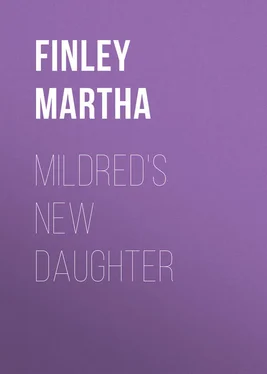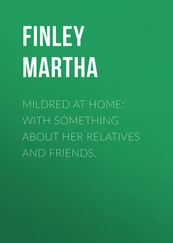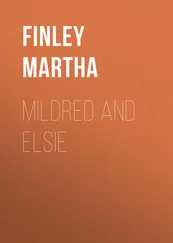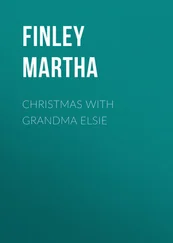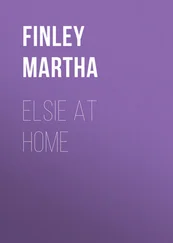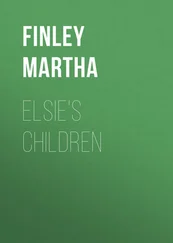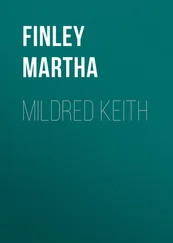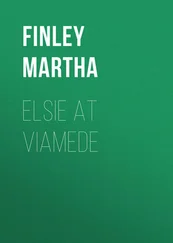Martha Finley - Mildred's New Daughter
Здесь есть возможность читать онлайн «Martha Finley - Mildred's New Daughter» — ознакомительный отрывок электронной книги совершенно бесплатно, а после прочтения отрывка купить полную версию. В некоторых случаях можно слушать аудио, скачать через торрент в формате fb2 и присутствует краткое содержание. Издательство: Иностранный паблик, Жанр: foreign_antique, foreign_prose, на английском языке. Описание произведения, (предисловие) а так же отзывы посетителей доступны на портале библиотеки ЛибКат.
- Название:Mildred's New Daughter
- Автор:
- Издательство:Иностранный паблик
- Жанр:
- Год:неизвестен
- ISBN:нет данных
- Рейтинг книги:3 / 5. Голосов: 1
-
Избранное:Добавить в избранное
- Отзывы:
-
Ваша оценка:
- 60
- 1
- 2
- 3
- 4
- 5
Mildred's New Daughter: краткое содержание, описание и аннотация
Предлагаем к чтению аннотацию, описание, краткое содержание или предисловие (зависит от того, что написал сам автор книги «Mildred's New Daughter»). Если вы не нашли необходимую информацию о книге — напишите в комментариях, мы постараемся отыскать её.
Mildred's New Daughter — читать онлайн ознакомительный отрывок
Ниже представлен текст книги, разбитый по страницам. Система сохранения места последней прочитанной страницы, позволяет с удобством читать онлайн бесплатно книгу «Mildred's New Daughter», без необходимости каждый раз заново искать на чём Вы остановились. Поставьте закладку, и сможете в любой момент перейти на страницу, на которой закончили чтение.
Интервал:
Закладка:
“No, mother, but Mrs. Coote’s girl told ours that they are some orphan little ones whom the Cootes have taken to bring up. Poor little dears, they are very young to be both fatherless and motherless!”
“Yes, indeed! and they are very attractive looking children, too.”
“So they are, and my heart aches for them, for there is nothing motherly in Mrs. Coote’s looks or ways – nothing the least fatherly about him.”
“Indeed, no! though he might perhaps have been different if they had been blessed with children of their own.”
“Ah, Hannah is baking ginger snaps! How good they smell! Mary and her little new friends must have some;” and with the words Mrs. Keith rose and went into the house.
She returned presently with a heaping plateful, which she handed first to her mother Mrs. Weston, then carried out to the garden where she bestowed a liberal supply upon little Mary and her new friends. Mary introduced them.
“Mamma, dis little dirl is Nan; de boy is named Harry; he is Nan’s bruver, and dose big dirls is Ethel and Blanche; dey’s Nan’s and Harry’s big sisters.”
“Not so very big, I think,” said Mrs. Keith, smiling kindly upon them. “Where are you from, my dear?” addressing Ethel. “And have you come to stay here with Mr. and Mrs. Coote?”
“Yes, ma’am,” answered Ethel as clearly as she could speak, in spite of the lump rising in her throat; “our uncles in Philadelphia sent us here to be taught. They didn’t say for how long, but Mr. Coote told me we are to stay till we grow big enough to take care of ourselves.”
“Well, dear, I hope you will be happy and prove pleasant playfellows for my little Mary,” returned the lady kindly. “If you are the good children I take you for, I should be glad to have you with her a good deal, because it will be pleasant for her, and you, too, I hope.”
“Yes, ma’am,” replied Ethel, dropping a little courtesy, “thank you. It will be very pleasant for us, I’m sure, for she seems a dear little girl; so we will come sometimes, if Mrs. Coote will let us.”
“Mayn’t dey tum in now, mamma?” pleaded little Mary.
“Certainly, if Mrs. Coote says they may,” replied her mother; then seeing Mrs. Coote near at hand she called to her and preferred the request.
“It’s no matter to me if you like to be bothered with them,” was the almost surly rejoinder. “To my way of thinking children are little else than a torment and pest, and I’m willing enough to have them out of my way if I know they’re safe.”
“As I think you may be pretty sure they will be with us,” returned Mrs. Keith in a slightly indignant tone, and with a glance of pity directed toward the young strangers. “Poor little orphans!” she added in a lower tone, “it will be really a pleasure to me if I can put some brightness into their lives.”
The next two hours passed very delightfully to the little Eldons, playing with their young hostess about the garden and in the porch of her father’s house, and making acquaintances with her mother, grandmother, and baby sister, her dollies and other toys, of which she possessed a goodly number.
In a kindly, sympathizing way Mrs. Weston questioned Ethel about her parents and her former home, and she was both greatly interested and much moved by the pathetic story told with the artless simplicity of a young and trustful child.
“My dear little girl,” she said, softly stroking Ethel’s hair when the tale had all been told, “truly I feel for you. It was a sad thing, indeed, to part so early from your dear parents, but God our Heavenly Father knows what is best for us, and loves His children more than any earthly parents can. The Bible tells us that He is a Father of the fatherless, and He can never die, will never leave nor forsake those who put their trust in Him. Go to Him with all your sorrows, all your troubles and trials, and He will be sure to hear and help you.”
Ethel listened with tears in her eyes. “I will, ma’am,” she said; “I do tell Him all my troubles and my little brother’s and sisters’ troubles, too, and ask Him to help us, and I’m sure He does. But oh, ma’am, why did He take away our dear father and mother while we are so little and need them so badly?”
“Perhaps to teach you to keep very near to Him, loving and trusting Him instead of any earthly creature,” the lady answered tenderly. “It is a grand lesson to learn; one that will make you better and happier all the days of your life. Jesus said to Peter, ‘What I do thou knowest not now, but shalt know hereafter’; and I think he is saying the same to you, dear child. When we get home to heaven we shall see and know just why all our trials were sent us – just how necessary they were and that our kind, wise Heavenly Father sent each one for our good.”
“Yes, ma’am,” returned the little girl thoughtfully, “I will try to remember it all and to be very patient and good.”
CHAPTER VIII
Mrs. Weston had hardly finished what she was saying to Ethel when Mrs. Coote’s harsh voice was heard summoning her young charges to their dinner. They hastened to obey, quite as much for fear that any delay would anger the woman and bring dire consequences upon themselves, as from a desire to satisfy their appetites.
The meal, like those that had preceded it, was plain but palatable, and the healthy little folks found it enjoyable.
“Now go out to your plays again,” was Mrs. Coote’s order when they had finished; “this is Saturday and I’m very busy, a great deal too busy to be tormented with a pack of children; so don’t venture to come in again till you’re called.”
“Let’s go back to that other house,” proposed Harry, when they had obeyed the order and were out upon the gravel walk leading to the front gate.
“Oh, no!” said Ethel, “don’t you remember that our mamma used to tell us not to go too often to any of our neighbors’ houses, because we would make them tired of us? There was a Bible text she used to repeat about it: ‘Withdraw thy foot from thy neighbor’s house lest he be weary of thee, and so hate thee.’ We want them to love us and feel glad to see us when we go there; so we won’t go very often when we’re not invited. The grass is dry now on this side of the yard and we can have a nice time playing here together.”
“Oh, yes,” said Blanche, “we can play ‘Pussy wants a corner.’ That’s good fun and we’ll be careful not to run too hard and do mischief.”
“And not to make too much noise,” added Ethel; “we mustn’t shout or laugh too loud, lest we vex Mrs. Coote.”
“Oh, dear!” sighed Harry, “I do like to make a noise. I guess all boys do, and I do wish we didn’t have to live where the folks want us to be quiet all the time.”
“But we can’t help it, Harry,” sighed Ethel, “we will just have to try to be quiet and good all the time.”
“Me will,” assented Nannette; “I is doin’ to be very dood.”
“So’ll I,” said Harry, “but I don’t like it a single bit.”
They played several games; then Nannette began to cry. She was tired and sleepy. Mrs. Coote heard her, came to the door, and understanding what was the matter, bade Ethel take her little sister up to their own room and lay her on the bed.
“And when she wakes up,” added Mrs. Coote, “it will be time for you all to have your Saturday bath; for everybody must be particularly clean for Sunday.”
“Yes, ma’am,” returned Ethel, “our own mamma always had us bathed on Saturday.”
“In which she showed her sense,” said Mrs. Coote. “Now hurry up to your room every one of you, and see if you can keep quiet there. You may as well all take a nap, for you have nothing better to do.”
Читать дальшеИнтервал:
Закладка:
Похожие книги на «Mildred's New Daughter»
Представляем Вашему вниманию похожие книги на «Mildred's New Daughter» списком для выбора. Мы отобрали схожую по названию и смыслу литературу в надежде предоставить читателям больше вариантов отыскать новые, интересные, ещё непрочитанные произведения.
Обсуждение, отзывы о книге «Mildred's New Daughter» и просто собственные мнения читателей. Оставьте ваши комментарии, напишите, что Вы думаете о произведении, его смысле или главных героях. Укажите что конкретно понравилось, а что нет, и почему Вы так считаете.
